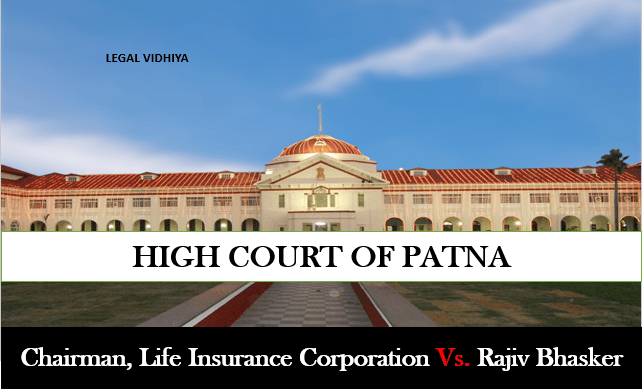
CITATION | AIR 2005 SC 3087 |
DATE OF JUDGMENT | 12 October |
COURT | HIGH COURT OF PATNA |
APPELLANT | Chairman, LIC |
RESPONDENT | Rajiv Kumar Bhaskar |
BENCH | S Jha, C K Prasad |
Facts
In accordance with the L.I.C. salary saving plan, the employer was required to take the premium out of the employee’s pay and deposit it with L.I.C. The employer was in charge of all relevant processes. The insurance had expired when the concerned employee passed away, and the heirs discovered that the company had neglected to make payments. L.I.C. depended on a provision in the employer’s acceptance letter stating that he would operate as an agent of his employees rather than L.I.C.
Issue
Whether the employer can be treated as the agent of the L.I.C despite the express agreement to the contrary?
Appellant contention
Umesh Prasad Singh, counsel for the appellants, argued that the learned single Judge made an error in relying on the decision in Delhi Electric Supply Undertaking v. Basanti Devi 1999 CCJ 1465 (SC), as the facts of the present case were different. In Basanti Devi’s case, the Delhi Electric Supply Undertaking (D.E.S.U.) had made deductions from the employee’s salary but failed to deposit premiums, while in the present case, the salary was not paid to the respondent’s father, so there was no question of deduction and deposit. Singh argued that in many undertakings and organizations, including universities in Bihar, salary is not being paid regularly to employees, which would contradict the aims and objects of the Salary Savings Scheme. L.I.C. was considering withdrawing the scheme from these undertakings or organizations. Sir Singh also argued that the writ petition was not maintainable as the respondent had filed a complaint under the Consumer Protection Act, which was pending. In Basanti Devi’s case, the complaint was filed under the Consumer Protection Act, and the Supreme Court decided the case based on the materials produced. In the present case, no copy of the Salary Savings Scheme has been brought on record, and it is unclear what the terms of the insurance policy were under which the respondent’s father obtained the insurance policy. Additionally, Singh argued that the learned single Judge should have referred the case to a larger Bench if he wanted to differ. Basically,
Respondent contention
The respondent’s skilled counsel argued that the Chameli Khatoon case, CWJC No. 9906 of 1998, had a distinct basis. In that instance, the employer’s role was limited to coordinating the payment; the employees were responsible for paying the premiums under the terms of the group insurance plan. the also submitted that the Salary Savings Scheme being the same throughout India.
Analysis
The Principal grants the agent express authority through spoken or written words.Implied authority is that which may be deduced from the employment arrangement or from the parties’ actions. separated into four categories: The four types of authority are as follows: (i) incidental authority, which is the power to act in a way that is typically or inevitably related to the proper execution of the express authority; (ii) usual authority, which is the power to act in a way that is customarily or normally used by those holding positions in specific trades or businesses; (iii) customary authority, which is the power to act in accordance with the custom and usage of the place where the agent acts; and (iv) authority derived from the specific facts of the case, the residuary category.
Judgement
In this instance, the term “agent” may not refer to a person as defined by the LIC of India (Agents) Regulation, 1972, but rather to an agent in the common understanding of the word. The legal character of the connection cannot be definitively determined by the presence or absence of the word “agent.”
Given that the employees were unable to contact the insurer directly and that the Corporation made no offers to them or would communicate with them directly regarding the payment or non-payment of the premium or any other related matter, it is evident that the employees were expected to treat their employers as “agents” of the Corporation, with the employer having a significant role to play in this affair. Moreover, only the employer was authorised to carry out the policy’s terms and conditions. This just emphasises the idea that the employers would function as the insurer’s representatives.
Whether or not one party may have given another’s express or implied consent to the creation of an agency, the court may conclude that the agency relationship was in place at that time for the relevant purpose when the existence of the relationship would aid in the resolution of a particular issue and the evidence allows the court to draw that conclusion.
Reference
https://indiankanoon.org/doc/243525/
https://indiancaselaw.in/chairman-l-i-c-v-rajiv-kumar-bhaskar/
This Article is written by Ananya Purwar student of Symbiosis Law School, Nagpur; Intern at Legal Vidhiya.
Disclaimer: The materials provided herein are intended solely for informational purposes. Accessing or using the site or the materials does not establish an attorney-client relationship. The information presented on this site is not to be construed as legal or professional advice, and it should not be relied upon for such purposes or used as a substitute for advice from a licensed attorney in your state. Additionally, the viewpoint presented by the author is of a personal nature.




0 Comments